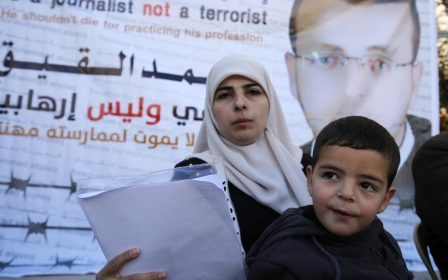Journalist's family says occupation now responsible for his life

DURA, Occupied Palestinian Territories - Hunger-striking Palestinian journalist Mohammed al-Qiq’s family said on Saturday that the Israeli occupation must now take responsibility for his life.
The family released a statement asking that all Palestinian factions hold a joint news conference denouncing the occupation and outlining negative consequences that could follow, after doctors said the journalist’s organs may soon fail.
Doctors at HaEmek Hospital in Afula, Israel, where al-Qiq is being held, said late Friday that the prisoner could face “immediate death,” according to lawyer Hiba Masalha from the Palestinian Authority’s Prisoners’ Affairs Committee.
Masalha quoted a deputy director at the hospital, Dr Tubia, without giving a first name, saying: “Each minute marks a serious threat to his life, because it is probable that his inner organs will stop operating at any moment.”
Al-Qiq was arrested on 21 November at his home in Ramallah for alleged terrorist links and has been held without trial under Israel’s controversial administrative detention policy that allows prisoners to be held without charge or trial indefinitely.
The 33-year-old father of two entered day 74 of a hunger strike in protest of his administrative detention. Demonstrations continued Saturday in different parts of Palestine, calling for his release.
On 27 January, al-Qiq’s lawyer, Jawad Bulous, brought an appeal to Israel’s supreme court requesting that al-Qiq be released from administrative detention due to his health. The request was denied.
After the ruling, the EU expressed its disapproval of al-Qiq’s internment without charge or trial. An EU statement said al-Qiq, and more than 500 other Palestinians being held on administrative detention, “have the right to be informed about the charges underlying any detention, must be granted access to legal assistance, and be subject to a fair trial”.
The EU mission added that they were “especially concerned about the deteriorating health condition of the Palestinian journalist”.
Israeli authorities have told al-Qiq’s lawyer that the reporter for Saudi-owned TV channel Almajd is being held under administrative detention for “incitement” against Israel as well as for working with Hamas, a Palestinian political group that rules the Gaza Strip and is considered illegal under Israeli law.
Al-Qiq was detained for a month in 2003, again in 2004 when he served 13 months, and again in 2008 for his activities in Ramallah’s Birzeit University’s student council.
Stay informed with MEE's newsletters
Sign up to get the latest alerts, insights and analysis, starting with Turkey Unpacked
Middle East Eye delivers independent and unrivalled coverage and analysis of the Middle East, North Africa and beyond. To learn more about republishing this content and the associated fees, please fill out this form. More about MEE can be found here.




